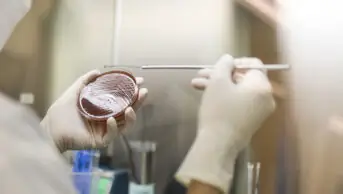
COURTESY OF THE OFFICE OF LORD JIM O’NEILL
The UK needs to do more to use diagnostic testing in the fight against antimicrobial resistance (AMR), the chair of a government-commissioned review on AMR told MPs.
Lord O’Neill, an economist and former treasury minister, warned in the review’s final report in 2016 that a continued rise in AMR would lead to 10 million people dying each year by 2050 and made ten recommendations, including the need for rapid diagnostics to reduce unnecessary use of antimicrobials.
Speaking to a Commons Science and Technology Committee evidence session on 22 June 2022, Lord O’Neill said that while he was pleased with progress on some of the recommendations published in his review in 2016, especially in the reduction of antimicrobials in agriculture, progress on diagnostics was “woeful”.
He said it was “alarming to me how we are not embedding state-of-the-art diagnostic technology right in the middle of our health systems”, adding that it could “really make a huge difference about whether an antibiotic is needed or not, and the right kind of antibiotic”.
“Our most aggressive recommendation was that we should ban the use of subjective prescriptions in secondary settings, at least in Western countries, until they’ve gone through a state-of-the-art diagnostics,” he continued.
“And nobody’s done it; they claim it’s a vicious circle, the technology isn’t there, but we have to give incentives in order to get this embedded because that would make a permanent difference.”
Lord O’Neill’s review in 2016 had called on “governments, regulators and other health system leaders [to] consider incentives to facilitate the uptake and use of rapid point-of-care diagnostics in primary and secondary care”.
In May 2021, the government confirmed that a national service offering point-of-care testing and treatment for sore throat was under development for community pharmacies across England.
However, prescribing services that require rapid point-of-care testing have been locally commissioned from pharmacies in some parts of England, including in Liverpool, where pharmacists are able to supply doxycycline to patients with an acute cough following a point-of-care test to demonstrate bacterial infection.
Point-of-care testing has been used in community pharmacies in Wales as part of a sore throat test-and-treat service that was originally piloted in Cwm Taf Morgannwg University and Betsi Cadwaladr University health board areas in 2018.
In 2020, it was decided by Healthcare Education and Improvement Wales (HEIW) that the service should not be routinely adopted.
Similarly, the National Institute for Health and Care Excellence (NICE) does not recommend routine use of rapid tests for streptococcal A infections in GP settings because current evidence for their effect on improving antimicrobial prescribing and stewardship is limited, compared with clinical scoring tools alone.
The Department of Health and Social Care was approached for comment, but did not respond in time for publication.
Read more: How to evaluate the clinical appropriateness of an antimicrobial


